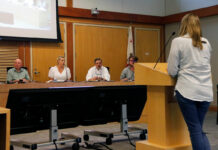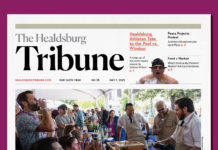I was avoiding Amour, the movie. I’d seen enough previews to know the story line and it frightened me. For a while I was saying I’d sooner see a Die Hard movie than Amour. And I’d have to be dragged to one of those brutal movies. And then sit through most of it with my eyes closed and then rant about Hollywood glorifying violence.
But the story of an older couple with one in sad decline would require eyes open and there would be nothing to glorify except for the fantasy of living in a book-filled apartment in Paris.
I said, I’m not sure I’m ready to see this. My husband asked, why not? It’s about people getting old. We’re going to get old. The point is to get old, he said. I conceded.
My mother had Alzheimer’s. One of my best friends had dementia. I know those blank eyes. My sister and I vow to stash pills so we can end things before that happens to us. A friend said that when he starts to lose it his wife promises to push him off the cliffs at Jenner. It’s a joke. Kind of.
My generation is famous for thinking we can age differently than our parents. We determinedly go to the gym, watch our salt intake, do crossword puzzles and take Spanish. We haven’t figured out a way not to die or not to get a terrible illness or be run over by a truck. But in general we think we’re maintaining better longer.
I’ve been writing about women and aging since I crossed into my 50s, nearly two decades ago. Back then the fear of aging for me and my contemporaries was not dying so much as being treated like an old person. The fear was of becoming irrelevant and discounted solely because of a birth date. And we’ve fought that well. Society likes old people so much they think we should keep working into our 70s.
But life’s realities have continued. My parents and my husband’s parents are gone. We’ve moved to the front of the line.
“We are all becoming die-able,” I said after a funeral for a friend.
Right now I look at illness and infirmity in the way I approach life in earthquake country. Most days I don’t worry about the earth cracking open, but then there is a surprise jolt, a reminder that oh yes, that could happen here, too. To me, to us.
At the movie theater a woman in our row kept hissing to her companion, “This is so depressing.” Well of course, it was. It was unflinching. But it wasn’t unbearable.
And there it was, the final challenge, even for Baby Boomers.
We meet the couple, Anne and Georges, too late to know much about them. We know they were intellectuals, musicians and teachers and had a daughter and a swell apartment. We don’t know their politics. Or their friends. We don’t know how they met. Did they have regrets?
The 85-year-old actress Emmanuelle Riva, who plays Anne, said in an interview that doing the role exorcised her fear of death.
I’m not sure the film did that for me. I know it did not exorcise my fear of losing control at life’s end. I’m still frightened of the prospect of my brain clicking off and losing my ability to be me. But hurray for a movie that isn’t afraid to take a long, quiet, sometimes agonizing look at what we know will come to us all, in one form or another. And asks if we will manage it with grace and kindness.
My husband and I saw the movie on Valentine’s Day. We skipped dinner and ate popcorn and walking home, we stopped for ice cream. Two big scoops with hot fudge.
Susan Swartz is an author and local journalist. You can also read her at www.juicytomatoes.com and hear her Another Voice commentary on KRCB-FM radio on Fridays. Email is su***@***********es.com.








